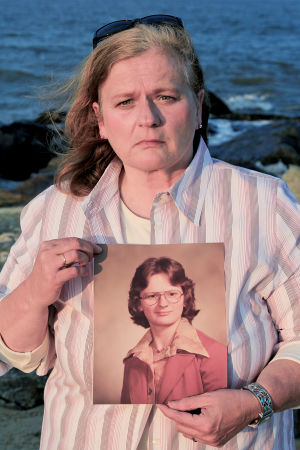Coping with the aftermath
- Font Size:
- Default font size
- Larger font size

Posted: Tuesday, August 27, 2013 11:00 am | Updated: 10:38 am, Wed Aug 28, 2013.
Note: This is the second in a three-part series detailing the experiences of Owosso-native Lana Lawrence in her quest for answers related to charges brought against her father for abusing her as a child.
Hitting her “like a ton of bricks,” Lana Lawrence read the words of her father’s sentencing report with disbelief. How could her father, who admitted to police and the court he raped her multiple times, not be sent to prison?
To Lawrence, it felt like she was serving out a sentence; the abandonment by most of her family, decades of depression and a feeling that she, a 16-year-old victim, had been betrayed by nearly everyone in her life.
“I read through it and saw what the sentence was and just felt devastated,” Lawrence said. “It was at that point most of my problems occurred, mostly depression.”
In the months following her father’s sentencing, Lawrence began acting out; partying, drinking heavily and taking drugs. In the two years she spent in the foster care system, Lawrence was placed in four different homes, none of which lasted long.
Lawrence twice attempted suicide by swallowing prescription pills. Her stomach had to be pumped during a three-day stay in intensive care in order to save her life.
“I think I had to find any way I could to escape everything that was going on,” Lana said. “The issue was I no longer felt safe. I didn’t understand what went wrong.”
Dr. Jennifer Freyd, a professor of psychology at the University of Oregon who specializes in trauma and has authored two books on the subject, said it is common for victims of abuse by someone they normally trust, such as a parent, to have behavioral issues. She’s coined this as “betrayal trauma,” where the victim battles between the hateful feelings toward their abuser and their dependence on them for their livelihood.
“It’s not unusual that people who have these experiences, are more likely to have a host of problems where their mental and physical health are affected. They are more likely to have symptoms of depression and anxiety. They are more likely to be sick, physically,” said Freyd, who has known Lawrence for 20 years through victim advocacy. “Betrayal trauma is toxic above and beyond other trauma. We already know trauma is not good for you, but betrayal trauma is particularly not good for you.
“This is important for understanding why people who get abused by someone they trust, like a parent, are so often not able to function well and suffer so much in life. It seems to be very destructive.”
Rhoda Hacker, director of SafeCenter in Owosso, said the longer the experience of abuse or betrayal, the more devastating for the victim.
“It has been shown to release those negative chemicals into the brain. It definitely has a long-term impact, and the longer the experience, the greater the impact,” she said. “We know it definitely can cause depression, suicidal thoughts and other mental conditions, and even physical.”
For Lawrence, this carried over to the judicial system. She entrusted the court — especially assistant prosecutor Scott Ryder, who handled both the probate and criminal court cases for Lawrence — with her well-being. In a vulnerable state, the 16-year-old victim found comfort in the fact someone was fighting for her.
“I recall Scott Ryder seeming very competent, and I felt that finally, someone was doing something to protect me,” she said. “I didn’t understand much of what was going on legally, however it seemed as though a lot of people were on my side because many people from CPS attended, as well as the state trooper and assistant prosecutor.
“He (Ryder) became a quasi-parent, if you will, because he’s the one in probate court who worked to keep me in foster care.”
But that feeling faded over time, after learning decades later her father was potentially undercharged and could have faced life in prison. Ryder has maintained he acted in the best interest of the victim in all of his cases, and had no reason to believe otherwise in Lawrence’s case, where he did remove her from an abusive home. But for Lawrence, what she calls his failure in criminal court was devastating.
“There’s only so many abandonments you can take in one life,” Lawrence said. “To think that a prosecutor was not acting in my best interest was hard to believe.”
Freyd, who said she has not reviewed Lawrence’s case, said this can leave a victim feeling as though what happened to them wasn’t that harmful.
“If the judicial system gives them a slap on the wrist, but without real consequences, that can certainly be perceived as a harmful betrayal because it’s hypocritical. It’s like, ‘we’re going to take this seriously, but not really,’” she said. “It truly fits with what we would hypothesize would be very damaging.
“We’re in a society where we believe the punishment should be commensurate with the crime. If the punishment is finer, we implicitly say that what happened wasn’t that bad. I think there is a huge difference to people. Some people may not pay attention to that message, but some people who are sensitive and trying to make sense of what happened to them are going to look at that and say ‘gee, maybe what happened to me wasn’t perceived to be that bad, because they really didn’t have a big consequence.’”
For decades, Lawrence said she dealt with the repercussions of the betrayal she experienced in her life. At times, she was able to move on from it, and has had times of joy and success.
Lawrence, a freelance photographer, had her photos of the Pentagon following 9/11 exhibited in the Library of Congress and they will soon appear in the 9/11 memorial in New York City.
She has become a national advocate for abuse victims, helping found support groups and even testifying in state legislature’s advocating for video recorded forensic interviews with victims. She also was sought out by national television news agencies as an expert on sexual abuse victims.
Lawrence for nearly a decade was a practicing funeral director, helping families cope with their loss. She wrote pieces for the National Funeral Director’s Association on bereavement in HIV/AIDS related deaths.
But during other times, the pain of the memory of the abuse and her father’s sentence returned; never more so than as she lay in the hospital with post-op Methicillin-resistant Staphylococcus aureus (MRSA) from a gall bladder removal. Lawrence has, to-date, had several medical conditions likely linked to the sexual abuse she endured.
After her gall bladder surgery, she developed not only MRSA, but had peritonitis (an inflammation of the tissues lining the inner wall of the abdomen), sepsis, which resulted in multiple organ failure, disseminated intravascular coagulation (which leads to formation of blood clots in blood vessels throughout the body), and had three abdomen abscesses removed.
Lawrence came close to death, she said.
“I thought about being on my death bed and not having my family there,” she said. “I just remember feeling very sad there wasn’t anybody there other than my partner.
“It was because I lost my family, and why? Because my father didn’t go to jail.”
That is what set Lawrence off on her journey to find the truth. She opened her case file, as tough as it was to bring the memories back up, and began reading. With more questions than answers, she brought it to Shiawassee County Prosecutor Deana Finnegan.
With Finnegan’s apology, Lawrence said, she’s begun to move on from the pain she felt as a result of the case.
“That beautiful apology letter is doing what it was meant to do — tell the truth in the light of day — and it has given me a new lease on life for which I am eternally grateful. My heart is so much lighter and I finally feel a real sense of deep healing that is sticking with me.”
— See Wednesday’s paper for Part 3 of Lana Lawrence’s story, which addresses how society has changed with increased awareness about abuse and the trauma caused by it.
More Coverage
- Searching for justice
- Society has made progress dealing with assault cases


No comments:
Post a Comment
Note: Only a member of this blog may post a comment.